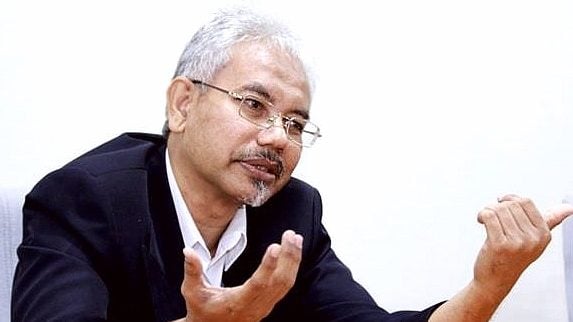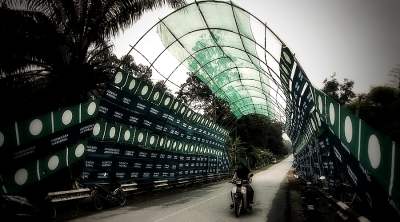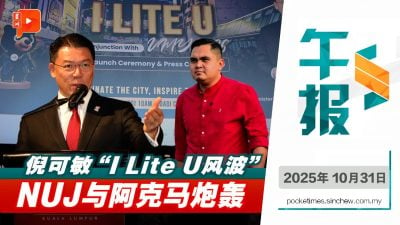
In his recent speech at the Kota Bharu Stadium filled with Malay Muslims of all ages and education, Tun Mahathir stood on a Parti Islam SeMalaysia platform and continued his Melayu-Malaysia narrative.
As usual, his favorite bedtime story is that Malaysia belongs to the Malays, and pendatang Cina and India came and were graciously allowed to be “guests” in this “house of the Malays,” but now the pendatang who were guests are demanding many things and have been given many things by the Malays.
Tun M’s message that the pendatang should be grateful that they were welcomed to the house of the Malays and that they should never forget their “status” of who they were and are.
For me, listening to these words of a former prime minister who was not once but twice given the trust of the people by democratic choice to lead, was disheartening.
I am a Malay and a Muslim and I do not share that narrative that my friends of my age are pendatang.
My family traces back to Pattani 100 years ago only, and the same for my wife who hails from Minangkabau from about the same timeline.
We are all pendatang, and this is now our country. Just like all the Europeans and Latin Americans who lived in the United States of America, they are all pendatang over the original inhabitants.
Tell that same story to Australia, New Zealand and many many more.
But these countries prospered and became new entities better than the older ones.
Would America have prospered under the original inhabitants, or would Australia and others?
The fact is, we will never know but we do know what happened in the present.
We should never look at the pendatang as a burden but a blessing.
Similarly, the Prophet Muhammad was also a pendatang.
The Prophet was born in Mecca at a time when there was no notion of a city-state but that each area of settlement was inhabited by tribal families joined in custom, religion and beliefs.
When the Prophet’s kafir uncle Abu Talib died, the Prophet no longer had the protection of his family clans who were mostly also not Muslims.
It is told in the Sirah that a group of men from the tribes in Yathrib came to offer him refuge as well as to be their “arbiter” between the politics of tribal conflicts in that small village.
And thus, at the Treaty of Aqaba, the Ansar (Helpers) of Medina pledged fealty to the Prophet Muhammad to protect him and his followers if he and they would settle in Yathrib.
In the days of Jahilliyah or Ignorance, no one could survive without the protection of a tribe or a family. You must live with your tribe or family or get someone from another tribe to proclaim protection rights for you.
When the Prophet arrived from Mecca with the Muhajirin (pendatang), he made a pact that was unusual. He proclaimed that the Ansar from Medinah who had families and property to be the brotherhood in Islam with the Muhajirin from Mecca who only had the things they managed to bring to the new place.
This is the sharing and spirit of Islamic “tetamu” or guests.
Many accepted and shared but there were also those who stayed in the Prophet’s house that became a meeting place or the mosque which was called much later.
Muslims nowadays celebrate the Hijra of the Prophet as a pendatang to Yathrib. After that, Yathrib was known as Medinah or the City of the Prophet.
With the acceptance of the Ansar as the host in Medina of the pendatang of the Prophet and the Meccans, Medina prospered to become now the holy city of Islam because this is where the grave of the Prophet resides, not in Mecca.
Once, after a battle that occurred in the days Mecca was liberated by the Prophet, he gave away much of the ghanimah or war booty to the new Muslims of Mecca.
The Ansar, who were the veteran warriors of Islam felt slighted and news got to the Prophet.
The Prophet gave a moving speech where he said that he gave the ghanimah to the new Muslims to tie their hearts more to Islam and that would the Ansar not be happy that they shall return to Medina with the Messenger of Allah.
The Ansar was moved to tears and said that they prefer the Prophet Muhammad to return with them rather than all the ghanimah of the world.
The value of this pendatang was more precious to them than all the wealth of the world and their families.
In the Qur’an, Surah Al-Hashr Verse 9, Allah made mention of the Ansar as the host of Medinah and their true qualities of sharing with the pendatang of Mecca and that this spirit is the highest form of piety:
As for those who had settled in the city and embraced the faith before the arrival of the emigrants, they love whoever immigrates to them, never having a desire in their hearts for whatever of the gains is given to the emigrants. They give the emigrants preference over themselves even though they may be in need. And whoever is saved from the selfishness of their own souls, it is they who are truly successful.
(Surah Al-Hashr Verse 9)
What then is the message of my article? The message is that we should never look at the pendatang as a burden but a blessing.
The pendatang from Mecca had made the city of Medinah prosper beyond the imagination of anyone at that time into a most coveted place in the Islamic world other than Mecca.
Tun M’s words are not Islamic in the sense that he is not generous but selfish.
Malays who follow the Qur’an and the ways of the Prophet must heed the Sirah or history of the Prophet and the teachings of the Qur’an that the pendatang to a host country in most time brought much gain and good to everyone.
Malaysia belongs to all of us, and its greatness and survival depend on everyone…you and me.
(Prof Dr. Mohd Tajuddin Mohd Rasdi is Professor of Architecture at a local university and his writing reflects his own personal opinion entirely.)
ADVERTISEMENT
ADVERTISEMENT








































